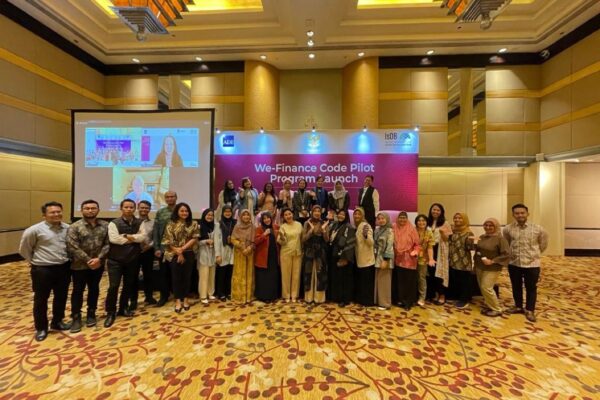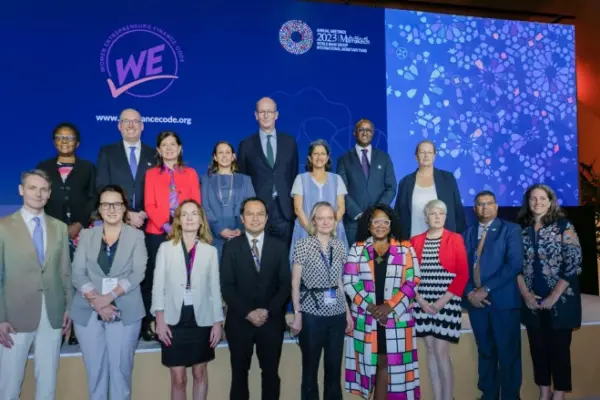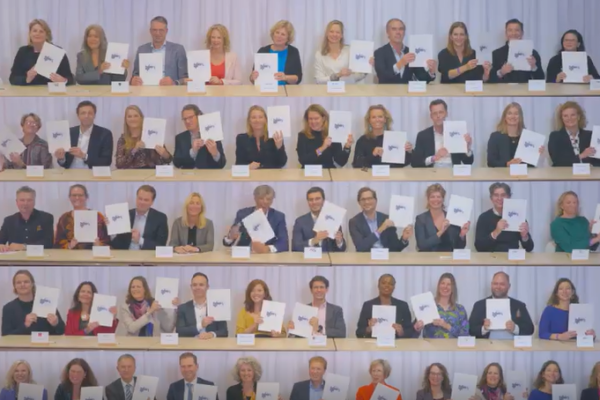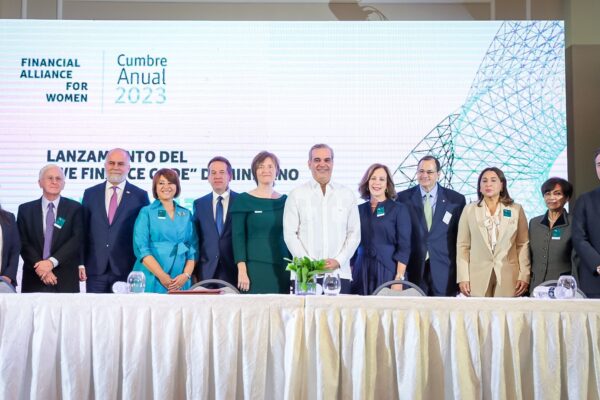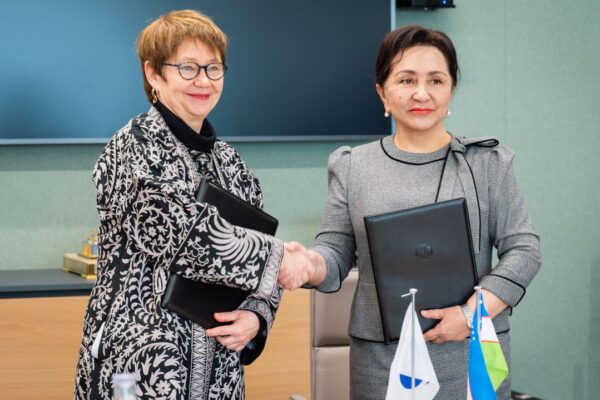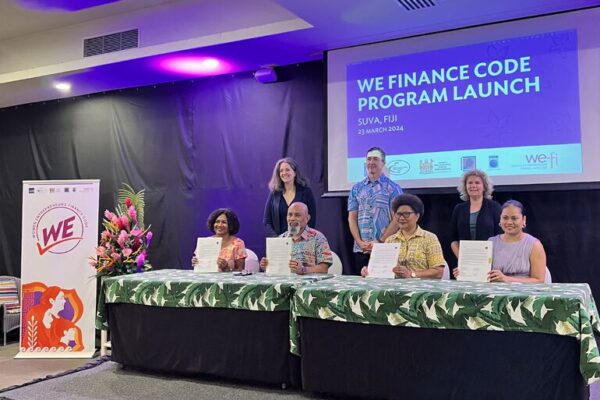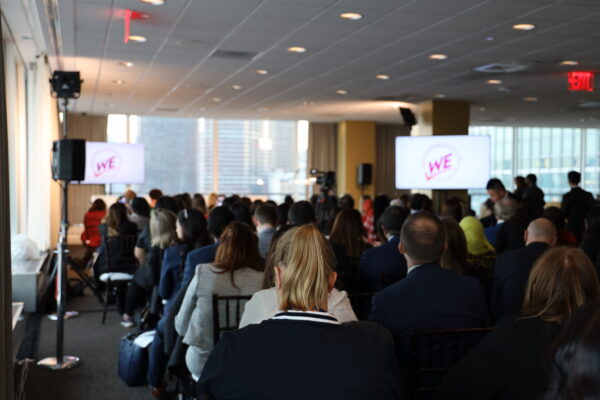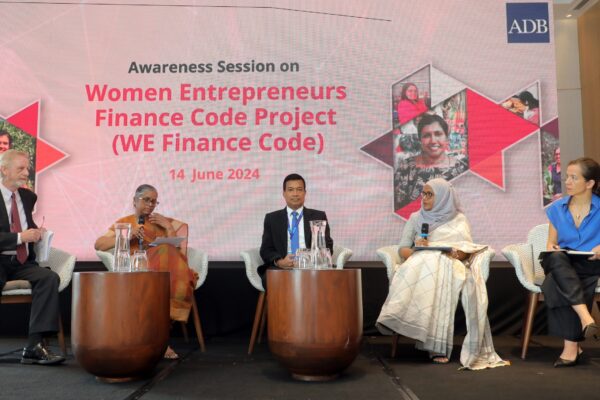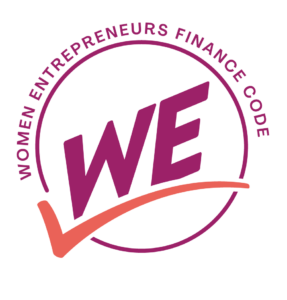
WE Finance Code
For Partners: View Implementation Resources
Knowledge Portal: Research and Supporting Evidence
Stay Tuned: WE Finance Code Communiqué
The Opportunity
Over 400 million women entrepreneurs around the world have vast potential to grow their businesses, add value to the economy, and create jobs, but they lack the financing to achieve their goals. They represent a $1.7 trillion growth opportunity for financial service providers (FSPs) and $5-6 trillion in potential value addition to the global economy.
The Code was developed with finance leaders from more than 30 private and public sector organizations to build upon the success of the UK Investing in Women Code and close the finance and data gaps affecting women entrepreneurs.
The Code
Organizations can participate in the Code in a growing number of pilot countries or through a global mechanism. Code participants commit to:
-
LEADERSHIP: Designating a member of their senior management team to champion the organizations’ efforts to support women-led businesses
-
ACTION: Expanding and introducing new measures that will support women entrepreneurs
-
DATA: Monitoring and reporting annually a commonly agreed set of indicators on the level of financing provided to WMSMEs or supporting others’ efforts to do so
Joining the Code
There are local and global channels for participating in the Code: Entities in countries with National Codes will participate through those National Codes, many of which are launching in 2024. Global organizations may participate in the Global Code.
A wide range of financial ecosystem players can participate in the Code at the global and national levels to drive systemic change. The Code helps to align their efforts to create reinforcing incentives, maximize their impact and enable learning.
Financial Institutions
Banks, monetary financial institutions, FinTechs, VCs
-
Champion the Code’s launch in their market
-
Sign up to the Code
-
Contribute to peer learning and best practices sharing
National Actors
Regulators, policymakers, industry associations
-
Champion National Code with FSPs
-
Embed Code in financial inclusion strategy, policies
-
Enable data collection, reporting
-
Create incentives for financial institutions
Investors and Development Finance Institutions
-
Provide gender-lens financing and capacity building for FIs, Regulators, SSBs
-
Engage in high level advocacy & policy dialogue
Ecosystem
Standard setters, global organizations, donors and knowledge partners
-
Support Code adoption and implementation in areas of domain expertise
National Actors
-
Increased financial inclusion of WMSMEs
-
Improved data and data‑driven policymaking
-
Improved incentives and alignment across the ecosystem
-
More diverse leadership in the financial sector
View Global Signatories
Launching the Code in country
Local champions are encouraged to build national public‑private coalitions to introduce the Code in their country. These coalitions adapt the Code’s flexible framework to the local context, ensuring national relevance and uptake. They establish WMSME definitions and data reporting guidelines and use established channels to track and report progress.
We-Fi Implementing Partners are supporting the following countries to pilot the WE Finance Code: Albania, Bosnia and Herzegovina, Côte d’Ivoire, Dominican Republic, Egypt, Fiji, Indonesia, Kazakhstan, Kosovo, Kyrgyz Republic, Madagascar, Mongolia, Morocco, Montenegro, Mozambique, Nigeria, North Macedonia, Rwanda, Senegal, Serbia, Somalia, Sri Lanka, Tajikistan and Uzbekistan.
Recognized National Code Coalitions have four common characteristics:
- A public declaration of intent to introduce the Code in country, adhering to the minimum guidelines of the Code’s global framework.
- Governance that creates oversight and accountability for local adoption of the Code.
- Designated coordinator to oversee local implementation and interface with and report to the Code’s global coordinator.
- A mechanism to aggregate data with integrity and in a format that will facilitate mainstreamin
Annual Country Reports are encouraged but optional.
Resources
-
WE Finance Code Introduction
-
WE Finance Code Brochure
-
Implementation Partner Guide
-
Kick-off Presentation PPT
-
WE Finance Code Charter National Charter Guidance
-
WE Finance Code Charter National Charter Template
-
Media Toolkit
-
WE Finance Code Briefing Note
-
National Code Sample Public Declaration of Intent
-
FSP Commitment Letter
-
Ecosystem Commitment Letter
-
Community of Champions Information
Latest News
-
BBVAMF joins the global alliance to finance women entrepreneurs
-
CARE Joins the WE Finance Code
-
Sri Lanka: ADB Launches First WE Finance Code in South Asia with the Government of Sri Lanka and Deloitte Advisory Services
-
Fiji: ADB and the Government of Fiji Launch WE Finance Code Pilot
-
The Netherlands: Code-V Launched to Improve Entrepreneurial Climate for Women
-
Indonesia: WE Finance Code Pilot Launches with Support from ADB and IsDB
-
Dominican Republic: IDB Invest Launches First WE Finance Code Pilot in Latin America and the Caribbean
-
WE Finance Code Launches with Endorsements from Leaders of Development Banks
-
A Livable Planet for All: Championing Digitalization by Women | WE Finance Code Launch Event
In Photos
Sample Letter of Commitment
WE Finance Code Commitment
“[Organization name] endorses the Code and will work together with partners and other stakeholders to provide leadership, improve data and take actions that will help eliminate constraints and financing gaps for women entrepreneurs. As a Signatory in the Women Entrepreneurs Finance Code, [name of institution] will:
-
Designate a senior leader to champion the organization’s efforts to support women-led businesses
-
Track a commonly agreed set of indicators on the level of financing provided to women-led firms
-
Expand and introduce measures that will support women entrepreneurs.
[Name of institution] will report on these commitments and indicators to an agreed aggregator after a grace period for inclusion in the Global WE Finance Code annual reports.” [Name of institution] will make this commitment public.
WE Finance Code Commitment
“[Organization name] endorses the Code and will work together with partners and other stakeholders to provide leadership, improve data and take actions that will help eliminate constraints and financing gaps for women entrepreneurs. As a Signatory in the Women Entrepreneurs Finance Code, [name of institution] will:
-
Designate a senior leader to champion the organization’s efforts to support women-led businesses
-
Work to expand the availability and use of supply-side data on the level of financing provided to women-led firms, including a commonly agreed set of indicators
-
Expand and introduce measures that will support women entrepreneurs.
[Name of institution] will report on these commitments annually to We-Fi for inclusion in the Global WE Finance Code annual reports.” [Name of institution] will make this commitment public.
…………….
Signature
Global FSPs can sign up to the Global Code.
Entities in countries with National Codes will participate through their National Codes.
FSPs can champion new National Codes if one does not exist in their country.
Get Involved
To inquire how to join or partner with the WE Finance Code, please email:
zzambo[at]worldbank.org

